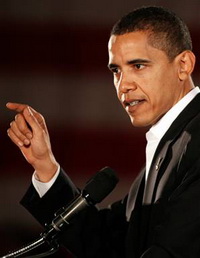White House Focuses on Afghan Plan
Wednesday U.S. President Barack Obama met his senior advisers to reconsider Afghanistan war strategy. The debate has exposed divisions over what to do next.

General McChrystal , the top U.S. and NATO commander in Afghanistan, has recommended an increase of 40,000 troops as the minimum necessary to prevail, according to sources. There are already 65,000 U.S. troops in Afghanistan and another 39,000 from allied nations.
McChrystal has also given Obama the option of sending more than the 40,000 additional troops -- up to 80,000 according to some sources -- and has described the option of sending no additional troops as "high risk." McChrystal has spoken in grave tones about Afghanistan, warning that success in the campaign against the Taliban could not be taken for granted.
McChrystal took charge of the Afghanistan operation after his predecessor, General David McKiernan, was ousted in May by Obama. McKiernan's exit signaled a shift from a conventional strategy to a counter-insurgency plan aimed at reducing civilian deaths, Reuters reports.
It was also reported, on one side of the White House debate are proposals to send at least 40,000 additional troops and trainers as part of a beefed-up counterinsurgency strategy advocated by the top U.S. and NATO commander in Afghanistan, General Stanley McChrystal.
On the other side are plans to hold steady on troop levels in Afghanistan and concentrate on attacking al Qaeda targets along the Afghanistan-Pakistan border and in Pakistan itself with the greater use of drones and special forces, a proposal backed by Vice President Joe Biden.
Obama could opt for a hybrid approach, officials said, whereby the administration would increase the number of troops in Afghanistan by a more modest amount and at the same time push for a more concerted campaign against al Qaeda and Taliban "safe havens" along the Pakistan-Afghanistan border and within Pakistani territory, Reuters reports.
The New York Times quoted McChrystal as saying, "Inadequate resources will likely result in failure."
The magnitude of the choice presented by McChrystal, and now facing President Obama, is difficult to overstate. For what McChrystal is proposing is not a temporary, Iraq-style surge — a rapid influx of American troops followed by a withdrawal. McChrystal’s plan is a blueprint for an extensive American commitment to build a modern state in Afghanistan, where one has never existed, and to bring order to a place famous for the empires it has exhausted. Even under the best of circumstances, this effort would most likely last many more years, cost hundreds of billions of dollars and entail the deaths of many more American women and men, The New York Times reports.
Subscribe to Pravda.Ru Telegram channel, Facebook, RSS!


